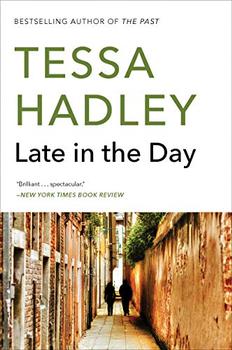Summary | Excerpt | Reviews | Beyond the Book | Readalikes | Genres & Themes | Author Bio

ONE
THEY WERE LISTENING TO MUSIC when the telephone rang. It was a summer's evening, nine o'clock. They had finished supper and Christine was listening with intensity, sitting with her feet tucked under her in the armchair; she recognised the music although she didn't know what it was. Alex had chosen it, he hadn't consulted her and now she stubbornly wouldn't ask – he took too much pleasure in knowing what she didn't know. He lay on the sofa in the bay window with a book open in his hand, not reading it, the book dropped across his chest; he was watching the sky outside. Their flat was on the first floor and the sitting-room window looked out over a wide street lined with plane trees. A gang of parakeets zipped across from the park, and the purple-brown darkness of the copper beech next door fumed against the turquoise sky, swallowing the last light. A black- bird silhouetted with open beak on a branch must be singing, but the recorded music overrode it.
It was the landline ringing. Christine was dragged away from the music; she stood up and looked around her, to see where they'd put the handset down when they last finished with it – probably somewhere here, among the piles of books and papers. Or in the kitchen with the washing-up? Alex ignored the ringing, or only showed he was aware of it by a little irritable tension in his face – always liquidly expressive, foreign, because the eyes were so dark, outlined as if they were painted. This effect was more striking as he was grow- ing older and brightness was leaching out of his hair, which used to be the colour of tarnished dark gold.
It was more likely to be her mother on the phone than his – or it might be their daughter Isobel, and Christine wanted to talk to her. Giving up on the handset, not bother- ing to fish in her bare feet for her espadrilles, she hurried up the stairs, taking them two at a time – she could still do it – to where the phone extension was, in their bedroom in the attic. The music carried on without her in the room behind, Schubert or something, and as Christine dropped onto the side of the bed and answered the phone breathlessly she was aware of the sweetness of a tumbling succession of descend- ing notes. This room they had made under the sharp angles of the roof held in all the heat of the day and was thick with smells – traffic fumes, honeysuckle from the garden below, dusty carpet, books, her perfume and face cream, the faint body-staleness of their sheets. The prints and photographs and drawings on the walls – her own work, some of it – had sunk into the shadows, obliterated, and only the pattern of their framed shapes showed against the white paint. Through the open skylight she could hear the blackbird now.
Sweetness
— Yes?
There was some confusion of noises at the other end of the line, as if the call was coming from a public place like a station, where it was difficult to speak. Intently someone was asking for her. — Can you hear me?
— Is it you, Lyd? Christine felt herself smiling pleasantly, sociable even though she couldn't be seen, sitting on the low bed with her knees pressed together. She thought that Lydia must have been drinking, which wasn't unheard of. Her voice was heavy, slurring as if something in it had come loose.
— What are you up to?
— I'm at the hospital, Lydia shouted. — Something's happened.
— What's happened?
— It's Zachary. He was taken ill at work.
The room quaked and its stillness adjusted, a few dust motes came spiralling down from the ceiling. Unheard of for anything to harm Zachary. He was a rock, he was never ill. No, nothing so numb as a rock: a striding cheerful giant with torrents of energy. Christine said she would call a cab at once, be with Lydia in half an hour at the most. — Which hospital? Which ward should I come to? What's the matter with him?
Excerpted from Late in the Day by Tessa Hadley. Copyright © 2019 by Tessa Hadley. Excerpted by permission of Harper. All rights reserved. No part of this excerpt may be reproduced or reprinted without permission in writing from the publisher.
We must believe in luck. For how else can we explain the success of those we don't like?
Click Here to find out who said this, as well as discovering other famous literary quotes!
Your guide toexceptional books
BookBrowse seeks out and recommends the best in contemporary fiction and nonfiction—books that not only engage and entertain but also deepen our understanding of ourselves and the world around us.